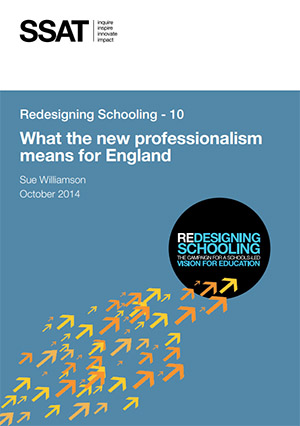
Did you know? You can access 100s of resources by becoming an SSAT member.
Login or enquire today.
Redesigning Schooling – 10: What the new professionalism means for England
In this pamphlet, Sue Williamson explores what the new professionalism means for the education system, school leaders, teachers and students. It calls on all those with claims to be the system’s leaders to agree on the purposes of the system, how it should be designed and operated, and how the success of that design can be judged. It means redefining relationships between stakeholders and developing leadership capacity within the school and the system. It also means developing, in partnership with higher education, a fully qualified, high-quality teaching profession that is capable of leading on pedagogy, curriculum design and assessment.
Leaders in education must be willing to engage with all key stakeholders to achieve successful outcomes for all students. Sue emphasises the need to establish a professional body focused on developing pedagogy and the profession, not regulation. Teachers and schools must be accountable, but it has to be intelligent accountability, based on professional standards, not political whims
or bureaucratic rules. The system has to allow the creation of a climate for teachers to establish a professional culture built on pedagogical thinking and practice, collaboration and research.
To become world-class we have to develop the ‘new professionalism’ – characterised by a relentless focus on improving the quality of teaching and learning, innovative practice, and engagement with research. The new professionalism will mean:
- Implementing SSAT’s and David Hargreaves’ definition of system leadership.
- Developing the leadership capacity within the school and the system.
- Committing to developing a fully qualified, high-quality teaching profession that is capable of leading on pedagogy, curriculum design and assessment.
- Developing a willingness to engage with all key stakeholders to achieve successful outcomes for all students.
- Ensuring that all teachers’ professional development includes research that contributes to ‘next practice’ in teaching and learning.
- Enabling and also expecting school leaders and teachers to foster focused collaborative cultures internally and in wider networks externally.
- Putting students at the heart of all we do.
Recommended reading
The new professionalism: Fostering collaboration, always learning
Bay House School's case study showcases their professional learning philosophy: keep teaching and learning (the core business) at centre stage and pursue the following steps: Research > Innovate with practical ideas > Share back (and repeat).
Read moreSSAT Membership
Join SSAT to gain free access to our widest range of CPD, programmes, tools and resources.

